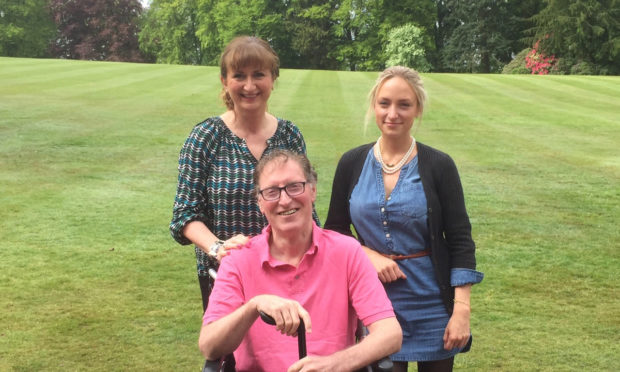The wife of a Perthshire man who plans to end his battle with Motor Neurone Disease at the Dignatas clinic in Switzerland says the current UK law is robbing her of extra time with her husband.
Elaine Selley said legalising assisted dying in the UK would mean husband Richard would be able to prolong his life, instead of being forced to travel in just a few weeks time, while he is still able.
The law requires Mr Selley to undertake every step of the process himself, meaning he must travel before he is unable to administer the fatal dose himself.
Elaine said the situation was robbing her of precious extra time with her husband.
The 57-year-old said: “Richard is very clear what he wants to do and he doesn’t want to see other people going through this. He wants to take control.
“It’s a horrible thing to go through, as his partner. Going to Switzerland is not something we want to have to do.
“If I could keep him for even one more day that would be great but he’s got to be able to do everything himself – he’s got to travel and administer the medication himself.
“They are making him choose to go early because he’s afraid that the choice is going to be taken from him and he wants to avoid a prolonged death.”
She said if patients were able to end their own lives in this country strict rules could be brought in, similar to those in Switzerland,where two doctors have to certify the patient is of sound mind.
She said: “It’s only a small proportion of people that would ever take this route in the last months of their lives – it’s not going to open the floodgates.
“Assisted dying is not suicide – it’s for people who are already dying.”
Richard, who lives in Glenalmond, was diagnosed with Motor Neurone Disease in March 2015 and spoke out about his plans last week.
The 65-year-old, the former head of Loretto junior school in East Lothian, said he intended to spend his remaining weeks raising attention to the issue in the hope he could help to bring about a change in the law.
Writing on his blog, he said: “I have long maintained that in some ways it is more difficult for the partners of those with MND (or any terminal illness) than for those with the actual disease. Living with such a condition can certainly be frightening, even terrifying at times, but there is some consolation in knowing that it will end, that there will be closure.
“For the partner, however, there is not only the constant pain of watching a loved-one suffer, and the feelings of utter helplessness that go with that, but also the knowledge that the pain will continue after he or she has gone.
“As I look forward, in both senses of the word, to an assisted death, it is easy for me to rationalise things in my head. I can tell myself that by dying I will be setting Elaine free, and in many ways that is true, but I am also acutely aware that she will be the one left behind to pick up the pieces.”
